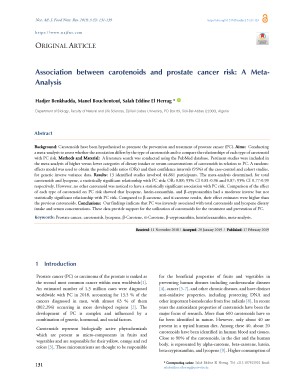Association between carotenoids and prostate cancer risk: A meta-analysis
Abstract
Background: Carotenoids have been hypothesized to promote the prevention and treatment of prostate cancer (PC). Aims: Conducting a meta-analysis to assess whether the association differs by the type of carotenoids and to compare the relationships of each type of carotenoid with PC risk. Methods and Material: A literature search was conducted using the PubMed database. Pertinent studies were included in the meta-analysis of higher versus lower categories of dietary intakes or serum concentrations of carotenoids in relation to PC. A random-effects model was used to obtain the pooled odds ratios (ORs) and their confidence intervals (95%) of the case-control and cohort studies, for generic inverse variance data. Results: 13 identified studies involved 44,861 participants. The meta-analysis determined, for total carotenoids and lycopene, a statistically significant relationship with PC risk; OR: 0.88; 95% CI 0.81-0.96 and 0.87; 95% CI 0.77-0.99 respectively. However, no other carotenoid was noticed to have a statistically significant association with PC risk. Comparison of the effect of each type of carotenoid on PC risk showed that lycopene, lutein-zeaxanthin, and β-cryptoxanthin had a moderate inverse but not statistically significant relationship with PC risk. Compared to β-carotene, and α-carotene results, their effect estimates were higher than the previous carotenoids. Conclusions: Our findings indicate that PC was inversely associated with total carotenoids and lycopene dietary intake and serum concentrations. These data provide support for the utilization of carotenoids for the treatment and prevention of PC.
Full text article
Authors
Copyright (c) 2019 Authors

This work is licensed under a Creative Commons Attribution 4.0 International License.
-
Attribution — You must give appropriate credit, provide a link to the license, and indicate if changes were made. You may do so in any reasonable manner, but not in any way that suggests the licensor endorses you or your use.
-
No additional restrictions — You may not apply legal terms or technological measures that legally restrict others from doing anything the license permits.





